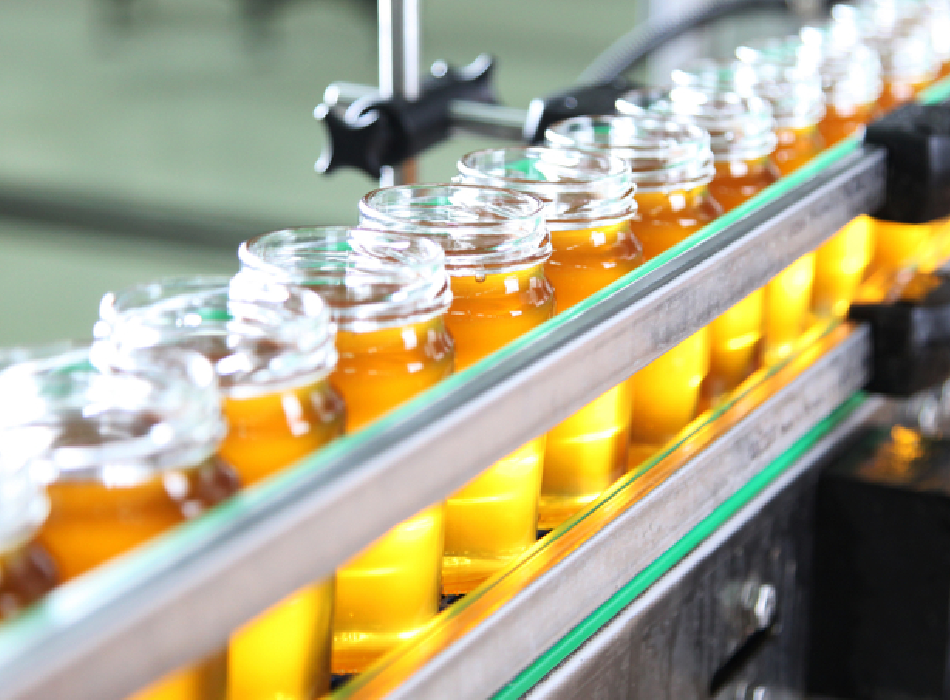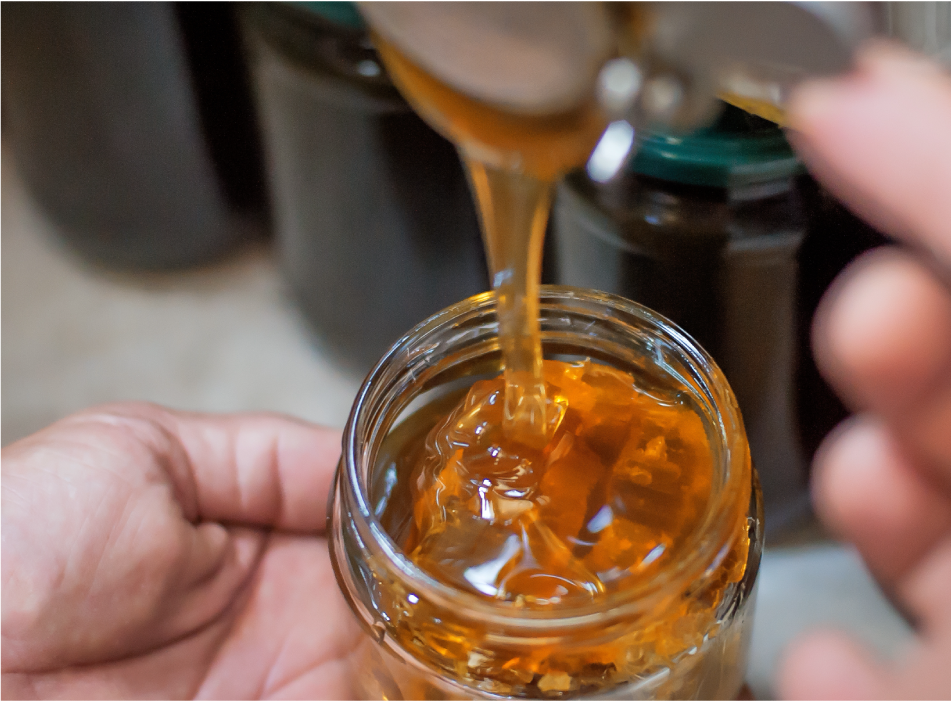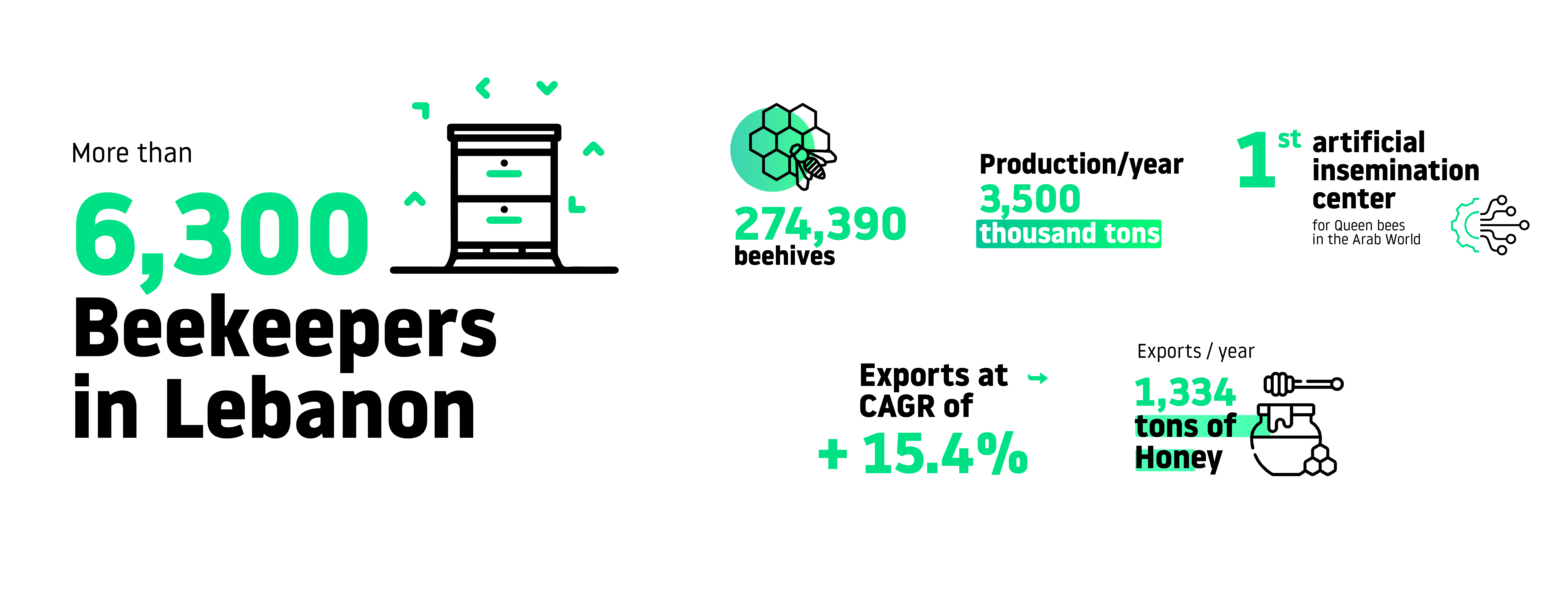Honey
Discover Lebanon through its wide variety of honeys that reflect the diversity of the land
Overview
Lebanese honey is unique worldwide due to its health and medicinal properties, superior quality, and exquisite taste. This uniqueness is mainly the result of Lebanon’s special topography that allows bees to feed naturally on the nectar of plants and trees throughout the year.
Lebanon possesses great advantages for the development of a competitive honey industry. With diverse altitudes, moderate climate characterized by four distinct seasons and a variety of flora, Lebanon is well positioned to be a major supplier of high-quality, authentic, and clean honey worldwide.
Based on the Ministry of Agriculture data, honey production in Lebanon witnessed major growth between 2011 and 2016 increasing by 75% to reach a market value of 65 million $US.



Industry Players
Lebanon’s annual production of honey is estimated at around 3,500 tons per year and is mostly focused on supplying high quality premium products as compared to mass production that requires the usage of unnatural techniques to increase the yield.
Lebanon has around 7,500 registered beekeepers in Lebanon, owning more than 360,000 beehives. The North and Mount Lebanon have the highest number of beehives.
Honey production in Lebanon is expected to witness strong growth fueled by increased investment from the private sector and support from non-governmental organizations. Over the past 5 years, Lebanese honey producers were working more on achieving better quality standards (ISO certifications) while the private sector was investing in innovative food testing laboratories, and marketing strategies, thus leading to an increase in local sales and exports.
More specifically, there has been increased investments in the needed infrastructure from both the public and private sector. Currently, there is more than 6 laboratories that have the capacity to test honey in Lebanon. The Lebanese Standards Institution (LIBNOR) also has issued national standards for honey production related to purity and freshness.
This has gone hand in hand with increased investment in Research and Development (R&D) to support the growth of industry: In September 2016, the first artificial insemination center for queen bees in the Arab world was launched in Lebanon with the support of USAID. During its testing period, the center produced more than 2,200 VSH queen bees through artificial insemination, in order to improve queen bee quality and lowering imports of low-quality queen bees, this thus increased the average productivity per hive and reduced the need for pesticides and antibiotics, ultimately reducing the cost of beekeeping.
The private sector has been equally investing in marketing and branding to be able to access international markets. This was complemented with support from international organizations to support farmers and rural entrepreneurs access more external markets.
There are very few brands that control the honey market in Lebanon. The sector is rather dominated by artisanal small producers and cooperatives that usually sell directly to their clients or in farmers markets and high-end health stores.
There is also a growing niche of organic honey production with major suppliers achieving the required certification to be able to access this competitive market globally.
Check our exporter directory to find our verified list of honey producers in Lebanon.
Export Performance
Export of natural honey hovered around $1m annually between 2017 and 2020. In 2020, exports of honey grew by 3% from previous year level reaching the equivalent of 1,334 tons of honey. The compounded annual growth rate for the export of honey is estimated at 15.4% since 2012.
About 66% of exports of Lebanese honey in 2020 were directed to the Gulf Cooperation Council countries, with Saudi Arabia accounting for 33% of total exports, followed by the UAE with 24% of total exports. Other important destinations were Jordan with 16% of total exports of honey, the US. with 12%, Côte d’Ivoire with 2.4% and Canada with 1.6% (Source: Lebanese Customs).


Our Advantage
- Special topography with diverse altitudes, variety of flora and moderate climate allows Lebanon to produce high-quality honey all year long.
- Growing Industry with many new brands developing superior and premium honey products
- Cost-competitive industry which requires minimal investments and is more hinged on the expertise of the beekeeper for quality and reliable production.

